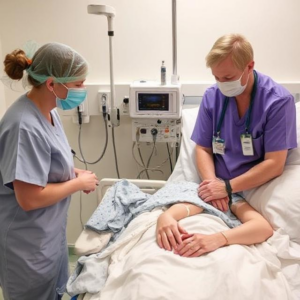
A troubling surge in cancer diagnoses among young adults is causing alarm worldwide, as experts warn that a combination of environmental factors, lifestyle changes, and delayed screenings could be driving the trend. Recent studies indicate a sharp increase in cases of colorectal, breast, and thyroid cancers in individuals under 40.
A Growing Concern
According to Dr. Emily Carter, an oncologist at Johns Hopkins Hospital, the trend is both concerning and perplexing. “Historically, cancer has been more prevalent in older populations, but we’re seeing younger patients come in with advanced stages of the disease,” she said. “This shift demands immediate attention and further investigation.”
A study published in The Lancet revealed that individuals born in the 1990s are twice as likely to develop colon cancer and four times as likely to be diagnosed with rectal cancer compared to those born in the 1950s. Experts believe this alarming rise is linked to factors such as sedentary lifestyles, poor diets, and exposure to carcinogens.
Patient Stories Highlight the Crisis
For 28-year-old Sarah Mitchell, the diagnosis of colorectal cancer came as a shock. “I never thought this could happen to me,” she said. “I eat healthy and exercise regularly, but I ignored the early symptoms because I thought I was too young for cancer.”
Sarah’s story is not unique. In India, 32-year-old tech professional Rohan Singh was recently diagnosed with liver cancer. “I was always under stress and didn’t prioritize regular health check-ups,” he admitted. “By the time I saw a doctor, the cancer had progressed significantly.”
Lifestyle and Environmental Factors
Dr. Maria Hernandez, a researcher at the National Cancer Institute, highlighted the role of environmental and lifestyle factors in the rise of young-onset cancers. “The modern diet, high in processed foods and sugars, combined with sedentary lifestyles, is a significant risk factor,” she explained. “Additionally, increased exposure to pollutants and chemicals is likely contributing to the trend.”
The Role of Early Detection
Health professionals emphasize the importance of early detection and regular screenings. Dr. James O’Connor, a colorectal surgeon, urged young people not to ignore symptoms like unexplained weight loss, persistent fatigue, or changes in bowel habits. “We need to change the narrative that cancer is an ‘old person’s disease,’” he stressed.
Global health organizations are calling for urgent action to address the issue. The World Health Organization (WHO) is advocating for increased awareness campaigns, better access to early screening, and funding for research into the causes of young-onset cancers.
“Governments must prioritize cancer prevention and control strategies,” said Dr. Tedros Adhanom Ghebreyesus, WHO Director-General. “The rising rates among young adults are a wake-up call. We cannot afford to delay.”
Ray of Hope
Despite the alarming trend, advances in cancer treatment offer hope. Dr. Carter noted that immunotherapy and targeted therapies have shown promising results in treating young-onset cancers. “While prevention is crucial, improving treatment outcomes is equally important,” she said.
As awareness grows, experts and survivors alike are urging young people to take charge of their health. “Listen to your body, advocate for yourself, and don’t delay seeing a doctor,” Sarah Mitchell advised.
The rise in cancer rates among young adults is a stark reminder of the challenges facing modern healthcare. With coordinated efforts, experts believe it’s possible to reverse this trend and protect the health of future generations.